
I know that time is precious, especially when it comes to maintaining a clean and inviting home. One of the most common challenges I face is dealing with unwanted odors in the refrigerator. Whether it’s the lingering scent of last week’s fish dinner or a mystery smell from a forgotten container, tackling these odors quickly is essential. In this article, I’ll share effective strategies on how to get smell out of refrigerator in under 30 minutes, drawing from my own experiences and tried-and-true methods.
Why Does Bad Smell Come Out of Fridge?

Understanding why bad smells develop in the refrigerator is the first step toward effective cleaning. The fridge is a treasure trove of various foods, and with all that variety comes the potential for odors. When food spoils, it can release gases and particles that permeate the air inside the fridge. Common culprits include:
- Spoiled Produce: Fruits and vegetables can rot quickly if not consumed in time, releasing foul odors that can spread throughout the fridge.
- Leftovers: While I try to keep track of my leftovers, sometimes they linger longer than intended, leading to unpleasant smells.
- Dairy Products: Milk and cheese can emit strong odors when they start to spoil, contributing to the overall scent.
- Seafood and Meat: These items are notorious for leaving behind lingering smells, especially if they leak or spoil.
- Poor Airflow: A cluttered fridge can trap air, making it easier for smells to build up rather than dissipate.
Recognizing these sources helps me address the issue promptly, ensuring my fridge stays fresh.
What Supplies Do You Need for a Quick Fix?

When it’s time to tackle that unpleasant smell, having the right supplies on hand makes the process faster and more effective.
- Baking Soda: This household staple is a powerhouse for odor absorption.
- Vinegar: A natural disinfectant and deodorizer, vinegar works wonders.
- Fresh Lemons: Their natural acidity and pleasant scent help combat odors.
- Coffee Grounds: They absorb odors effectively and leave a pleasant aroma.
- Activated Charcoal: This is excellent for long-term odor control.
- Cleaning Cloths or Paper Towels: These are essential for wiping down surfaces.
- Spray Bottle: Ideal for mixing and applying cleaning solutions.
With these items ready, I can quickly launch into the cleaning process.
Start with a Fridge Empty-Out

The first step in any serious odor-fighting mission is to empty out the fridge. This might sound daunting, especially when you’re juggling a busy schedule, but trust me, it’s worth it. Here’s how I tackle this step:
- Take Everything Out: I start by removing all items, placing them on the countertop or a nearby table. This gives me a clear view of what I’m dealing with.
- Check Expiration Dates: As I go through each item, I make sure to toss anything that’s expired or questionable. This prevents future odors from lurking.
- Assess for Spoilage: I also look for any food that might have gone bad, such as wilted greens or forgotten leftovers, ensuring I eliminate potential odor sources right away.
This process not only clears out the bad smells but also gives me a chance to reorganize and refresh the fridge’s contents.
How Can Baking Soda Help Eliminate Odors?
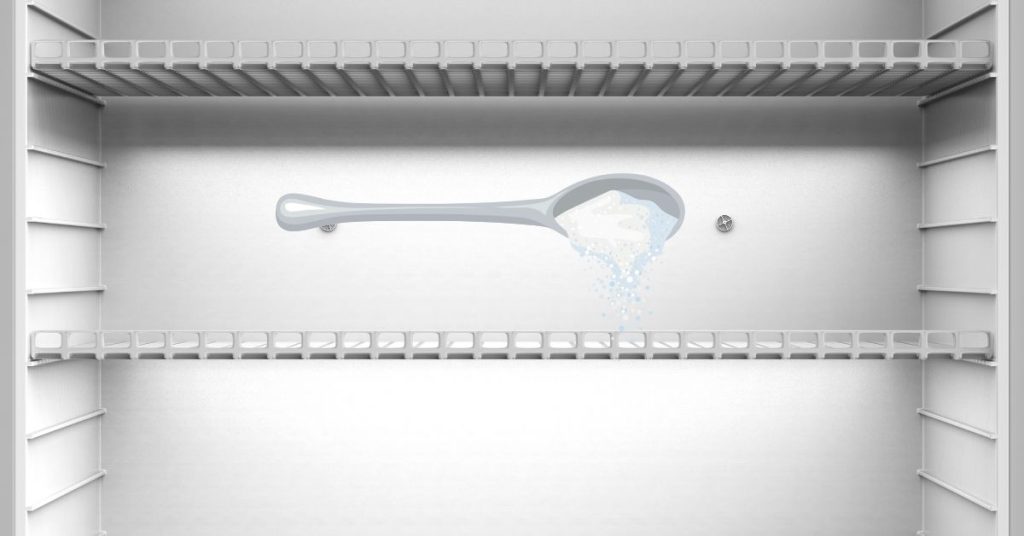
Baking soda is my go-to solution when it comes to neutralizing odors. Its chemical structure allows it to absorb unpleasant smells effectively. Here’s how I use it:
- Sprinkle on Shelves: After cleaning the surfaces, I sprinkle baking soda on the shelves and let it sit for a few minutes. This allows it to soak up any remaining odors.
- Open Container: I also keep an open container of baking soda in the fridge as a preventive measure. This way, it continuously absorbs smells, maintaining a fresh environment.
The beauty of baking soda is that it’s non-toxic and safe to use around food, making it a perfect choice for families.
What’s the Best Way to Wipe Down Shelves?
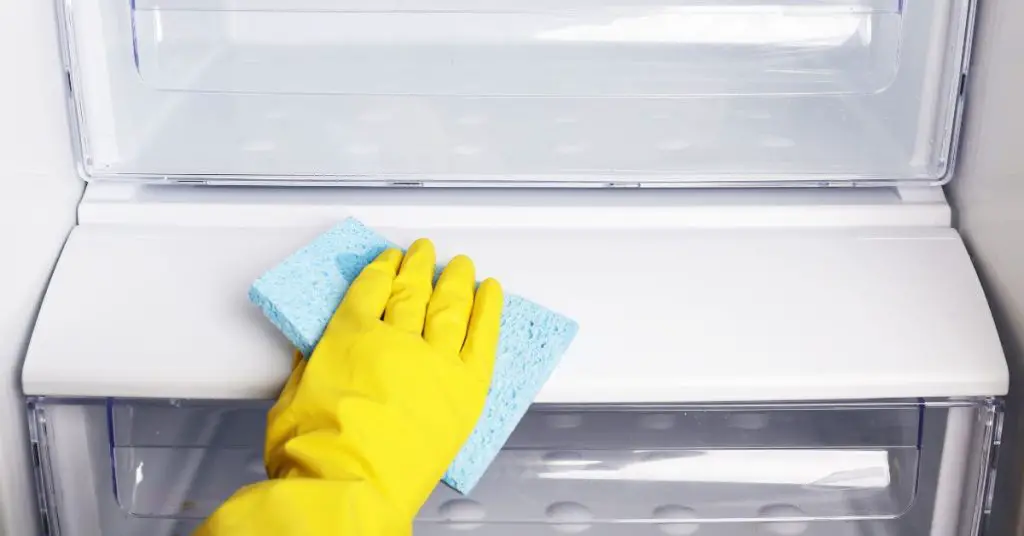
Once I’ve emptied the fridge and tackled the odors, it’s time for a thorough wipe-down. Here’s my method for getting those shelves sparkling clean:
- Use a Vinegar Solution: I mix equal parts of water and vinegar in a spray bottle. This natural solution not only disinfects but also deodorizes effectively.
- Wipe Down Surfaces: With a clean cloth, I spray and wipe each shelf and surface. I pay special attention to corners and crevices where spills may have gone unnoticed.
- Dry Thoroughly: After cleaning, I use a dry cloth to ensure there’s no moisture left, as dampness can lead to mold and additional odors.
This step leaves my fridge looking fresh and helps eliminate lingering smells.
How Can a Vinegar Spray Refresh Your Fridge?
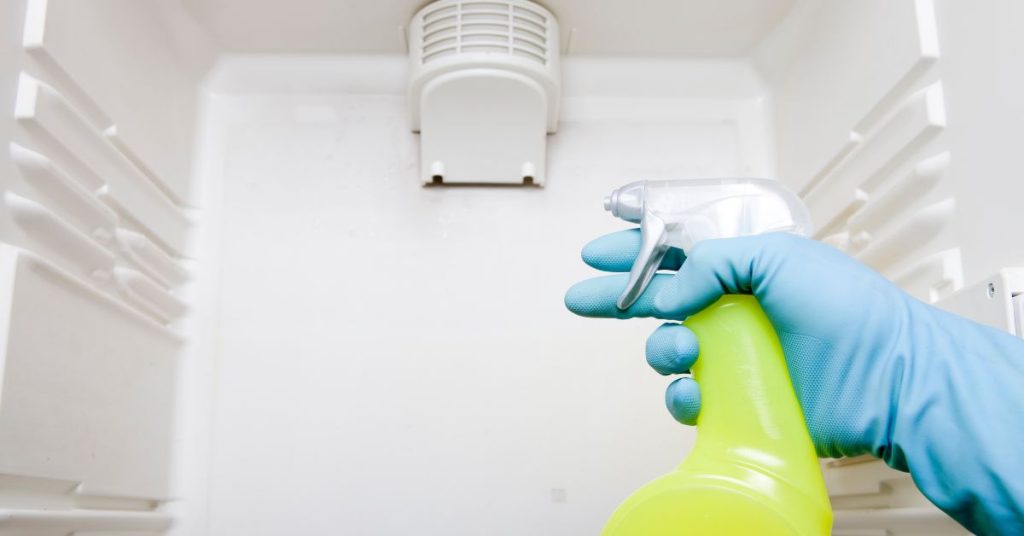
Vinegar is another fantastic odor-fighting agent I rely on. Its acidity cuts through smells and helps clean surfaces effectively. Here’s how I utilize vinegar:
- Prepare the Spray: I mix one cup of vinegar with one cup of water in a spray bottle. This creates an effective, non-toxic cleaning solution.
- Spray and Let Sit: After wiping down the shelves, I spray the vinegar solution around the fridge, letting it sit for a few minutes to neutralize odors.
- Wipe Away: After letting it sit, I wipe the surfaces again with a clean cloth, ensuring everything is fresh and odor-free.
Vinegar not only cleans but also leaves a pleasant, light scent that enhances the fridge’s freshness.
Can Fresh Lemon Really Help Reduce Odors?
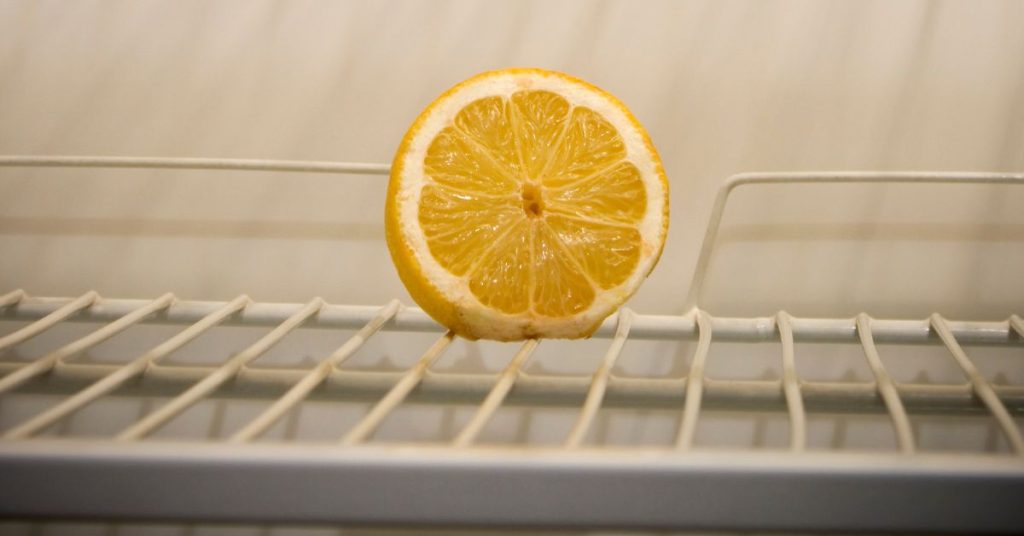
Fresh lemon is not just for flavoring water; it’s a natural deodorizer that can transform the scent of your fridge. Here’s how I incorporate it:
- Slicing Lemons: I slice a lemon in half and place it in a bowl or on a shelf. The citric acid helps neutralize odors while adding a fresh scent.
- Lemon Juice Spray: For an added boost, I sometimes mix lemon juice with water in a spray bottle and use it to wipe down surfaces.
The zesty aroma of lemon is uplifting and keeps my fridge smelling inviting.
How Do Coffee Grounds Absorb Bad Smells?
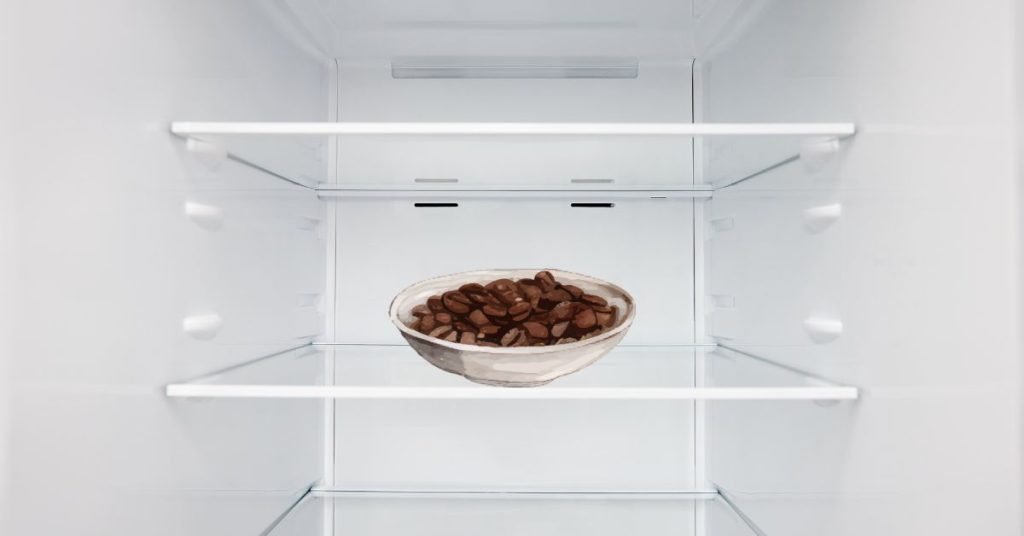
Coffee grounds might seem like an unusual choice for fridge maintenance, but they work wonders in absorbing odors. Here’s my approach:
- Place Open Container: I fill a small bowl with used coffee grounds and place it in the fridge. The grounds absorb unwanted smells and replace them with a subtle coffee scent.
- Change Regularly: I make it a habit to replace the coffee grounds every few weeks to ensure maximum effectiveness.
This method is particularly helpful for anyone who enjoys coffee, as it utilizes a common household item.
What Role Does Charcoal Play in Odor Removal?
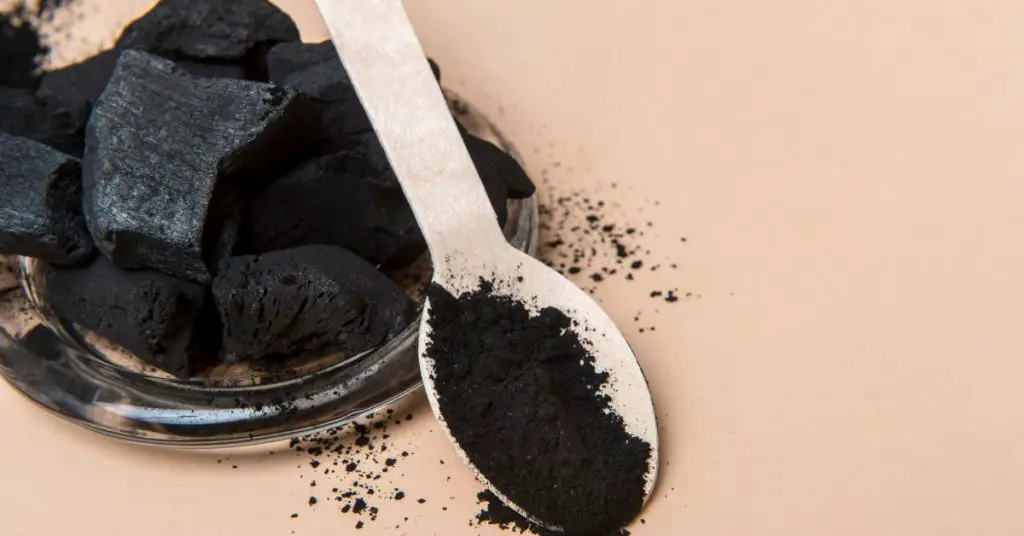
Activated charcoal is another fantastic option for long-term odor control. Here’s how I use it:
- Purchase Activated Charcoal Bags: I keep a small bag of activated charcoal in my fridge. It’s specifically designed to absorb odors and moisture.
- Placement: I place it on a shelf or in a corner, allowing it to work its magic quietly.
Activated charcoal can last for months, making it a great investment for maintaining a fresh-smelling fridge.
How Long Does It Take for a Fridge to Stop Smelling?
After implementing these cleaning techniques, you might wonder how long it will take for the smells to dissipate. In my experience, it can take anywhere from a few hours to a couple of days, depending on the severity of the odors. However, following these steps can significantly speed up the process.
- Immediate Freshness: You’ll likely notice a difference right away after cleaning and using deodorizing agents like baking soda and vinegar.
- Ongoing Maintenance: Keeping the fridge organized and regularly cleaning it will help maintain that freshness.
How Can You Store Fresh Produce to Prevent Smells?
Preventing odors from developing in the first place is the best strategy. Here’s how I store fresh produce to minimize potential smells:
- Use Ventilated Storage: I store fruits and vegetables in perforated bags or containers to allow air circulation, which helps prevent spoilage.
- Keep Similar Items Together: I separate items like apples and bananas, as some fruits release ethylene gas, which can speed up spoilage in others.
- Regularly Check Freshness: I make it a point to inspect my produce weekly, removing anything that’s starting to go bad.
These simple steps can significantly reduce the chances of odors developing in the fridge.
How to Get Fish/Rotten Meat Smell Out of Refrigerator?
Fish and meat odors can be particularly strong and lingering. Here’s how I tackle these specific smells:
- Immediate Cleanup: As soon as I notice any leaks or spills, I clean them up immediately to prevent smells from settling in.
- Baking Soda and Vinegar Combo: After cleaning the area, I apply baking soda and spray it with vinegar, letting it sit for a while before wiping it away.
- Use Odor Absorbers: I place a bowl of baking soda or activated charcoal near the source of the smell until it dissipates.
These strategies can help eliminate even the toughest odors, ensuring my fridge remains fresh.
How to Get Onion Smell Out of Refrigerator?
Onions can leave a strong and persistent smell in the fridge. Here’s how I combat this issue:
- Seal Left overs Properly: I make sure to store any leftover onions in airtight containers to minimize the scent spreading.
- Baking Soda Solution: I use a bowl of baking soda in the fridge, especially after using onions, to absorb the odor.
- Wipe with Vinegar: A quick wipe-down with vinegar can help neutralize any lingering smells.
By taking these preventive measures, I can keep my fridge smelling fresh and inviting.
How to Remove Garlic Smell from Fridge?
Garlic, like onions, can leave a strong scent in the fridge. Here’s how I handle garlic odors:
- Airtight Storage: I always store garlic in a sealed container to limit its smell from permeating other foods.
- Baking Soda or Coffee Grounds: Placing a bowl of baking soda or coffee grounds in the fridge helps absorb the garlic scent.
- Vinegar Wipe: I use a vinegar solution to wipe down any surfaces that might have come into contact with garlic.
These steps help ensure that my fridge doesn’t carry over any unwanted garlic odors.
What Is Used to Deodorize Refrigerators?
There are several effective options available to deodorize refrigerators. Here are some common choices I’ve found useful:
- Baking Soda: This is a classic choice for absorbing odors.
- Activated Charcoal: Known for its powerful absorption capabilities, activated charcoal is great for ongoing odor control.
- Vinegar: Its natural acidity neutralizes odors and cleans surfaces.
- Coffee Grounds: They not only absorb smells but can also leave a pleasant coffee scent.
Choosing the right deodorizer can make all the difference in maintaining a fresh fridge.
How Do You Make Homemade Fridge Deodorizers?
Creating a homemade fridge deodorizer is simple and can be quite effective. Here’s a method I often use:
- Baking Soda and Essential Oils: I mix half a cup of baking soda with a few drops of my favorite essential oil (like lemon or lavender). This not only absorbs odors but also adds a lovely fragrance.
- Vinegar and Water Spray: A mixture of equal parts vinegar and water in a spray bottle can serve as a quick and effective deodorizer.
- Lemon and Salt: I sometimes slice a lemon, sprinkle salt on it, and place it in the fridge. This combination deodorizes while providing a fresh scent.
These homemade options are natural and safe for my family.
Can I Put Air Freshener in a Fridge?
While the idea of using an air freshener might seem tempting, I personally avoid it. Here’s why:
- Chemical Residue: Most air fresheners contain chemicals that can contaminate food, making them unsafe for use in a refrigerator.
- Better Alternatives: Instead, I rely on natural odor absorbers like baking soda, charcoal, or fresh citrus to keep the fridge smelling great without risking food safety.
If you’re looking to freshen up your fridge, stick with natural options!
Can I Use Dettol to Clean My Fridge?
Using Dettol or similar disinfectants can be effective for cleaning surfaces, but I proceed with caution. Here’s my take:
- Dilution is Key: If I decide to use Dettol, I always dilute it according to the instructions and ensure it’s safe for surfaces that come into contact with food.
- Thorough Rinsing: After cleaning, I make sure to rinse surfaces thoroughly to remove any chemical residue.
While it can be used, I often prefer natural alternatives like vinegar for peace of mind.
What Quick Fixes Can You Use to Prevent Future Odors?
Finally, establishing a few quick fixes can help prevent future odors from developing in your refrigerator. Here’s what works for me:
- Regular Cleaning Schedule: I set aside time each week to check and clean my fridge, ensuring it stays fresh.
- Odor Absorbers: I consistently use baking soda or activated charcoal to keep odors at bay.
- Smart Storage Solutions: Using clear bins and labels helps me keep track of items and reduce clutter.
By implementing these simple habits, I can maintain a fresh and odor-free fridge, even with a busy household.
Conclusion
Keeping your refrigerator smelling fresh doesn’t have to be a daunting task, even for busy parents. With quick fixes and a bit of organization, you can tackle unpleasant odors in under 30 minutes. From utilizing baking soda and vinegar to establishing a regular cleaning routine, these strategies have worked wonders in my home. By addressing smells promptly and using effective preventive measures, you can enjoy a clean and inviting fridge that enhances your kitchen experience.
